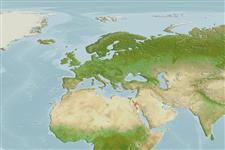分类 / Names
俗名 | 同种异名 | Catalog of Fishes(属, 种) | ITIS | CoL | WoRMS | Cloffa
Teleostei >
Pleuronectiformes (Flatfishes) >
Soleidae (Soles)
Etymology: Aseraggodes: Greek, aggos, -eos, -ous = vessel, uterus, carapace of a crab + Greek, aseros, -a, -on = to remove the appetite (Ref. 45335); macronasus: Named for its unusually long anterior nostril..
Environment: milieu / climate zone / depth range / distribution range
生态学
海洋 礁区鱼类; 深度上下限 5 - 18 m (Ref. 95111).
Western Indian Ocean: Red Sea.
大小 / 重量 / 年龄
Maturity: Lm ? range ? - ? cm
Max length : 6.2 cm SL 雄鱼/尚未辨别雌雄; (Ref. 95111)
简单描述
检索表 | 型态特徵 | 形态测量图
背棘 (总数) : 0; 背的软条 (总数) : 63 - 69; 臀棘: 0; 臀鳍软条: 45 - 50; 脊椎骨: 35 - 36. This species is distinguished by the following characters: D 63-69; A 45-50; in adults the dorsal and anal fin rays are branched, except for about first 20 rays of dorsal fin; caudal rays 18; lateral-line scales 66-72 (including 7 anterior to upper end of gill opening); vertebrae 35-36; dorsal pterygiophores anterior to fourth neural spine 11 or 12; body depth 2.7-2.75 in SL; head length 4.05-4.45 in SL; snout length 2.7-3.0 in head length; anterior nostril on ocular side tubular and very long, its length 3.6-4.1 in head length; ventral profile of head nearly straight, with very fine cirri on margin; caudal-peduncle length 13.0-14.5 in head length, its length 2.8-3.9 in SL; colour in alcohol of ocular side of adults light gray-brown, finely mottled with whitish; many scales rimmed posteriorly with dark brown; 2 dark brown blotches slightly larger than eye centered on lateral line, separated by a distance equal to head length; a few lesser dark brown spots on or near lateral line; dorsal and anal fins have translucent membranes and yellowish rays, some with faint small dark spots; caudal fin similar, but with small dark brown spots on basal scaled part of fin; a series of well-spaced, dark blotches of about eye size below base of dorsal fin and above base of anal fin; colour of holotype in life is yellowish gray, the scales narrowly dark-edged; many pale bluish gray spots, some in clusters forming irregular blotches, especially on head and anterior half of body; red from gill filaments showing faintly through operculum; a small white spot on opercular flap; dark blotches as described in preserved specimen; iris of eyes brown with spoke-like yellow lines, the pupil dark green, narrowly rimmed in yellow (Ref. 95111).
This species was collected from sand or sand and rubble substrata near or within coral reefs. It is typically hidden in sand by day, but active at night, may move from sand to rock or
coral, however, it quickly retires to sand if alarmed. Skin toxin present and may be used for repelling attacks (Ref. 95111).
Life cycle and mating behavior
Maturities | 繁殖 | Spawnings | Egg(s) | Fecundities | 仔鱼
Randall, J.E., S.V. Bogorodsky and O. Mal, 2013. Four new soles (Pleuronectiformes: Soleidae) of the genus Aseraggodes from the western Indian Ocean. J. Ocean Sci. Found. 8:1-17. (Ref. 95111)
人类利用
工具
特别资料
下载 XML
网络资源
Estimates based on models
Phylogenetic diversity index (Ref.
82804): PD
50 = 0.5000 [Uniqueness, from 0.5 = low to 2.0 = high].
Bayesian length-weight: a=0.00977 (0.00473 - 0.02021), b=3.07 (2.90 - 3.24), in cm total length, based on LWR estimates for this (Sub)family-body shape (Ref.
93245).
营养阶层 (Ref.
69278): 3.4 ±0.5 se; based on size and trophs of closest relatives
回复力 (Ref.
120179): 高度, 族群倍增时间少于 15个月 (Preliminary K or Fecundity.).
Fishing Vulnerability (Ref.
59153): Low vulnerability (10 of 100).
